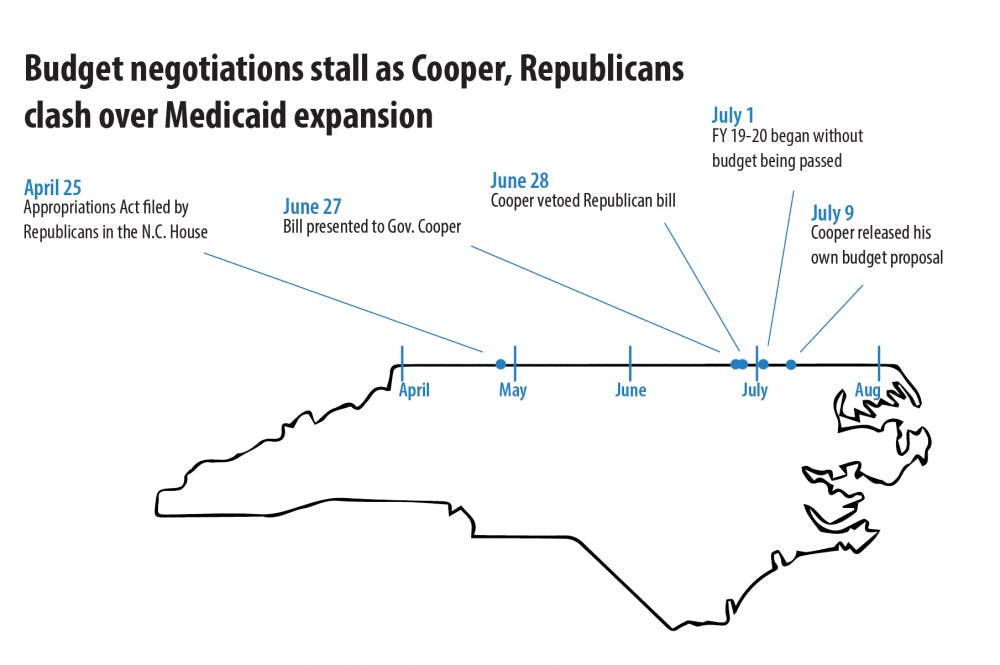“It would provide health care for 600,000 uninsured (North Carolinians), save at least some of our rural hospitals, create 43,000 new jobs over a period of years and bring $4 billion of our own tax dollars per year into the state,” Insko said.
She said behind-the-scenes negotiations have circled around the ability of Republican leaders to garner votes for a veto override.
“The speaker is telling (President Pro Tempore) Phil Berger that he can get enough Democrats to vote for the override, but so far he has been unsuccessful,” Insko said. “The governor is working with Sen. Berger and is making progress getting him on board with a modified Medicaid bill that would add some other features in addition to the work requirement and the co-pay."
She said she's optimistic about their chances if House Democrats sustain the veto for another few weeks.
But many on the other side of the aisle oppose expansion. Joe Coletti, senior fellow at the John Locke Foundation, said the financial costs to the state would outweigh potential health benefits.
“There are many better ways to increase access and lower cost of medical care, reduce the cost of insurance, and improve the health of people in rural areas or with low incomes,” Coletti said.
Teacher Pay
Terry Stoops, vice president for research and director of education studies at the John Locke Foundation, pointed out the need for merit-based pay increases for public school teachers.
“This budget does not change the way we pay teachers,” Stoops said in a statement. “While Republican lawmakers should be lauded for funding performance bonuses, our state continues to rely on a defective experience- and credential-based teacher salary schedule."
But many Democrats believe the Republican proposals don’t go far enough to increase teacher pay. Sen. Valerie Foushee, a Democrat representing Orange and Chatham counties, emphasized the importance of Cooper's proposal, which includes across-the-board raises. She said the state needs to attract quality educators, and his plan does more to achieve that.
"Rather than cut corporate taxes further, or pay for school construction from the general fund, the Democratic budget plans balances investments that pay off in the long term," she said.
Corporate Tax Cuts
To get the day's news and headlines in your inbox each morning, sign up for our email newsletters.
Donald Bryson, president and CEO of the Civitas Institute, voiced support for the proposed cuts to corporate taxes in the Republican proposals.
“Overall revenue, we think, will actually increase,” Bryson said. “And that’s due to wage growth and having more employed people paying income taxes, and also paying sales taxes as they’re able to buy things.”
Bryson said he believes the proposed tax cuts would be an economic boon to the state.
“We do think it will create an additional 43,000 jobs over 10 years if we were to reduce the corporate income tax,” Bryson said. “There will be wage growth, so overall salaries in North Carolina will increase by about $11 billion.”
But Democrats like Insko support the governor’s opposition to proposed cuts to corporate taxes, while maintaining reductions in certain income taxes.
“He wants to use part of the $800 million in surplus that is still on the bottom line to increase salaries for teachers and other state employees including UNC and (community college) system faculty and staff – instead of the corporate tax cut,” Insko said. “He would keep the middle class tax cut.”
What could happen?
Unlike budget negotiations on a federal level, there is no risk of a government shutdown while Democrats and Republicans negotiate the details. But Foushee said the passage of a new budget is urgent.
“In 2016, Republicans passed a continuing resolution that would essentially prevent a state government shutdown,” Foushee said. “What this does is allows the state to function at the same spending levels as it has over the previous fiscal year."
State workers won't get a raise, and school districts won't get added funds for class size and supplies, she said.
"In short, there will be no new funding until there is a new budget,” she said.
@MichaelJTaffe
city@dailytarheel.com



